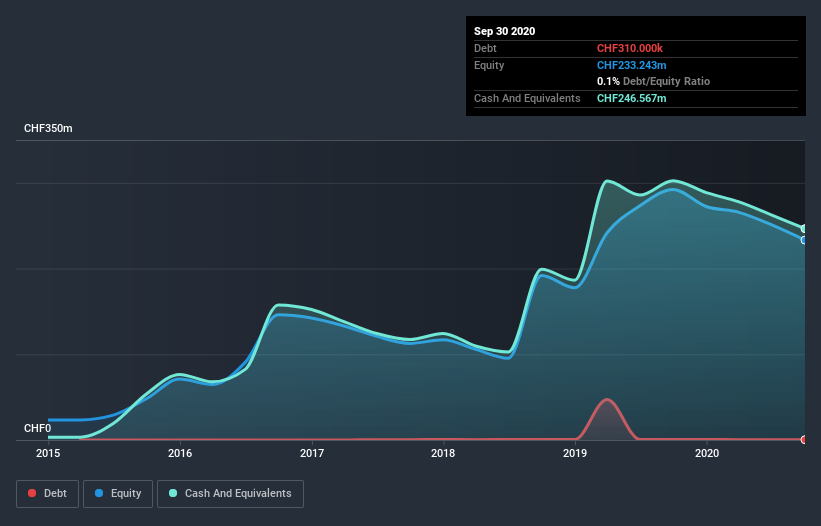- United States
- /
- Biotech
- /
- NasdaqGM:ACIU
We're Hopeful That AC Immune (NASDAQ:ACIU) Will Use Its Cash Wisely

We can readily understand why investors are attracted to unprofitable companies. For example, although Amazon.com made losses for many years after listing, if you had bought and held the shares since 1999, you would have made a fortune. Having said that, unprofitable companies are risky because they could potentially burn through all their cash and become distressed.
So, the natural question for AC Immune (NASDAQ:ACIU) shareholders is whether they should be concerned by its rate of cash burn. In this article, we define cash burn as its annual (negative) free cash flow, which is the amount of money a company spends each year to fund its growth. First, we'll determine its cash runway by comparing its cash burn with its cash reserves.
Check out our latest analysis for AC Immune
Does AC Immune Have A Long Cash Runway?
A company's cash runway is calculated by dividing its cash hoard by its cash burn. As at September 2020, AC Immune had cash of CHF247m and such minimal debt that we can ignore it for the purposes of this analysis. In the last year, its cash burn was CHF54m. So it had a cash runway of about 4.5 years from September 2020. A runway of this length affords the company the time and space it needs to develop the business. Depicted below, you can see how its cash holdings have changed over time.

Is AC Immune's Revenue Growing?
Given that AC Immune actually had positive free cash flow last year, before burning cash this year, we'll focus on its operating revenue to get a measure of the business trajectory. Sadly, operating revenue actually dropped like a stone in the last twelve months, falling 86%, which is rather concerning. While the past is always worth studying, it is the future that matters most of all. For that reason, it makes a lot of sense to take a look at our analyst forecasts for the company.
How Easily Can AC Immune Raise Cash?
Since its revenue growth is moving in the wrong direction, AC Immune shareholders may wish to think ahead to when the company may need to raise more cash. Generally speaking, a listed business can raise new cash through issuing shares or taking on debt. Commonly, a business will sell new shares in itself to raise cash and drive growth. By looking at a company's cash burn relative to its market capitalisation, we gain insight on how much shareholders would be diluted if the company needed to raise enough cash to cover another year's cash burn.
Since it has a market capitalisation of CHF405m, AC Immune's CHF54m in cash burn equates to about 13% of its market value. As a result, we'd venture that the company could raise more cash for growth without much trouble, albeit at the cost of some dilution.
How Risky Is AC Immune's Cash Burn Situation?
On this analysis of AC Immune's cash burn, we think its cash runway was reassuring, while its falling revenue has us a bit worried. Considering all the factors discussed in this article, we're not overly concerned about the company's cash burn, although we do think shareholders should keep an eye on how it develops. Its important for readers to be cognizant of the risks that can affect the company's operations, and we've picked out 2 warning signs for AC Immune that investors should know when investing in the stock.
Of course AC Immune may not be the best stock to buy. So you may wish to see this free collection of companies boasting high return on equity, or this list of stocks that insiders are buying.
If you decide to trade AC Immune, use the lowest-cost* platform that is rated #1 Overall by Barron’s, Interactive Brokers. Trade stocks, options, futures, forex, bonds and funds on 135 markets, all from a single integrated account. Promoted
New: Manage All Your Stock Portfolios in One Place
We've created the ultimate portfolio companion for stock investors, and it's free.
• Connect an unlimited number of Portfolios and see your total in one currency
• Be alerted to new Warning Signs or Risks via email or mobile
• Track the Fair Value of your stocks
This article by Simply Wall St is general in nature. It does not constitute a recommendation to buy or sell any stock, and does not take account of your objectives, or your financial situation. We aim to bring you long-term focused analysis driven by fundamental data. Note that our analysis may not factor in the latest price-sensitive company announcements or qualitative material. Simply Wall St has no position in any stocks mentioned.
*Interactive Brokers Rated Lowest Cost Broker by StockBrokers.com Annual Online Review 2020
Have feedback on this article? Concerned about the content? Get in touch with us directly. Alternatively, email editorial-team (at) simplywallst.com.
About NasdaqGM:ACIU
AC Immune
A clinical stage biopharmaceutical company, discovers, designs, and develops medicines, and therapeutic and diagnostic products for the prevention and treatment of neurodegenerative diseases associated with protein misfolding.
Flawless balance sheet and good value.
Market Insights
Community Narratives


